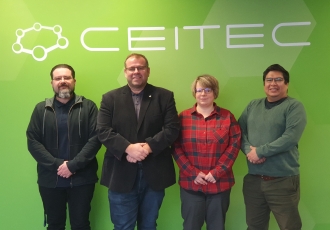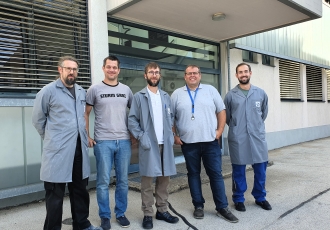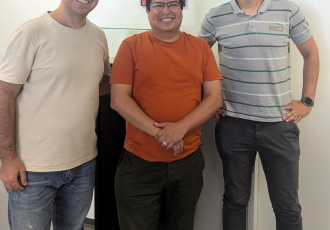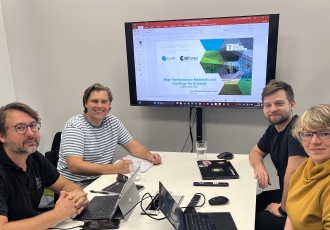10. Dec. 2024
Scientists from the High-Performance Materials and Coatings for Industry research group at CEITEC BUT, led by Ladislav Čelko, have joined the ambitious European project CLiCAM (Cultivating Leaders for Innovative Coatings and Additive Manufacturing). The project, with a budget of almost 2 million euros, aims to turn talented researchers into innovation leaders (ERA talents) who will be able to connect academia with industry – to efficiently communicate with companies and jointly solve specific challenges. CEITEC researchers, together with other partners from across Europe, will thus work to transform basic research into industrial solutions in advanced materials, surface treatments, additive manufacturing, and biotechnology, thereby strengthening Europe’s technological sovereignty.
“For us, it is crucial to understand how foreign companies work and how they transfer technology from research to practice,” explains Ladislav Čelko to set the context. His team has long focused on collaborating with industrial partners, which sets them apart from most other research groups at CEITEC, mainly dedicated to basic research. “We wanted to expand foreign cooperation not only in academia but also in industry. The CLiCAM project allows us to understand, through internships, how foreign companies deal with technology transfer, patents, and projects from a practical –that is industrial – perspective,” he adds. The project has managed to establish cooperation with eight foreign partners, including large companies (e.g. Treibacher Industrie AG, Austria) and smaller start-ups (3D Center, Poland).
Internship at Treibacher Industrie AG: Development of advanced materials and applications in industry
Some have already completed their three- to six-month internships, while others are planning to go abroad in the next two years. Ladislav Čelko, who spent three months at Treibacher, emphasises the differences in working culture: “In Austria, working hours are strictly defined: Monday to Thursday between 7 am and 4 pm. Fridays are meant for scheduling, and then most people go home. People focus on finishing what has been scheduled. As opposed to the Czech Republic, where we usually plan more than can realistically be done.” He says that the emphasis on efficiency and completing tasks in a given time is one of the key differences. Another difference is in the approach to intellectual property: “At Treibacher Industrie, they have a specialist in patent applications and IP screening. In many companies here, there is no such thing,” he adds.
As the head of the research group, Ladislav took away from the internship valuable experience in project management and was inspired by the different approaches that he wants to bring to CEITEC. During his internship, he specifically focused on thermal spraying of ceramic materials and the analysis of powder flowability, discovering that the standard principles used are often not indicative of this type of technology. The internship was also beneficial for the Austrian company, where he brought a lot of interesting insights and unconventional skills. As a result, he is currently working with colleagues on a project to develop advanced coatings for the aerospace industry. During the project, the compositions of the advanced material systems being developed will be tested, and the coatings created from them will be ready for implementation in aircraft at the end of the project. In addition, further collaboration is being arranged with the company for CEITEC PhD students.
Internship at ZOZ GmbH: Development of kinetic mills and special powder materials
Pavel Gejdoš spent three months at ZOZ in Siegen and Wenden, Germany, where they specialize in the development of kinetic mills and the production of specific custom powders. These mills are advanced devices that use kinetic energy to crush and grind materials into fine particles – from microparticles to nanopowders. The resulting powders are used, for example, in thermal spray coatings, which serve as protective layers against heat, corrosion or wear, in industries such as energy, automotive, and aerospace. “During our internship, we tested new processes that allowed us to achieve optimal particle sizes and streamline the preparation process. We have already applied the knowledge gained here at CEITEC to our kinetic mill projects,” explains Pavel. He sees the internship as beneficial not only because of the technologies that the company develops and supplies to the whole world but also because of the time division into two parts, which allows us to thoroughly process the prepared materials and plan the next follow-up steps.
During his internship, Pavel worked on projects that ZOZ cannot usually handle. He focused on the preparation of ceramic-metal powder composite materials. He suggested ways to better utilize the input materials and his work contributed not only to the optimization of the grinding processes but also to the efficient usage of waste materials. These results can now bring economic and environmental benefits to the company.
Internship at 3D Center: 3D printing of metal materials and technical polymers
Michaela Remešová completed an internship at 3D Center, a Polish start-up company that deals with 3D printing of metal materials and technical polymers. Michaela was part of a young team that had a strong technical focus on 3D printing but often concentrated only on printing without considering the material properties and cost-effectiveness of the process. They discussed ways to optimize production and offer customers cheaper and more efficient solutions, including designing different surface treatments to increase the utility of the products thus prepared.
Internship at Lithoz: Advanced 3D printing of ceramic materials
Edgar B. Montufar undertook internship at Lithoz, Austria, a renowned leader in stereolithography 3D printers for ceramic materials. Lithoz is known not only for its innovative devices and materials for 3D printing ceramics but also for its key role in industrial manufacturing, which includes applications in aerospace, automotive, and medicine. This internship provided him with the opportunity to work with cutting-edge technologies, gaining an in-depth understanding of advanced manufacturing processes that are at the cutting edge of ceramic 3D printing.
CLiCAM Virtual Labs
In addition to strengthening human capital in research and innovation, CLiCAM also includes the concept of a virtual laboratory. This acts as a network platform that allows work to be efficiently distributed, and samples shared between institutions, thus enabling more complex scientific tasks to be covered. Instead of investing in new technologies, the knowledge and technology already available at the individual project partners can be used.
CLiCAM to combat bias: Connecting academia and industry
The CLiCAM project is a ground-breaking step in the collaboration between academia and European industry, effectively breaking down the myth that academic outputs are not practical enough for the specific needs of companies. This innovative initiative focuses on linking research to real industry requirements, thereby actually delivering concrete and measurable results – as described above by the individual ERA talents. The companies involved in this project, initially sceptical about what academia has to offer, have begun to see the positive benefits of this collaboration. The project is thus laying the groundwork for future research investments such as interdisciplinary projects, virtual testing ecosystems, and spin-off companies.


 Share
Share





